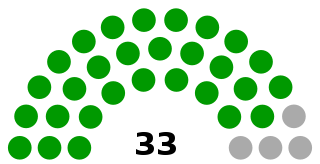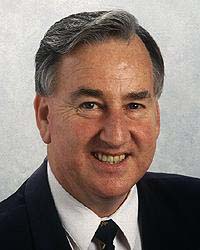Related Research Articles

The House of Lords is the upper house of the Parliament of the United Kingdom. Like the lower house, the House of Commons, it meets in the Palace of Westminster in London, England. One of the oldest institutions in the world, its origins lie in the early 11th century and the emergence of bicameralism in the 13th century.

The Parliament of the United Kingdom of Great Britain and Northern Ireland is the supreme legislative body of the United Kingdom, and may also legislate for the Crown Dependencies and the British Overseas Territories. It meets at the Palace of Westminster in London. Parliament possesses legislative supremacy and thereby holds ultimate power over all other political bodies in the United Kingdom and the Overseas Territories. While Parliament is bicameral, it has three parts: the sovereign, the House of Lords, and the House of Commons. The three parts acting together to legislate may be described as the King-in-Parliament. The Crown normally acts on the advice of the prime minister, and the powers of the House of Lords are limited to only delaying legislation.

The politics of Russia take place in the framework of the federal semi-presidential republic of Russia. According to the Constitution of Russia, the President of Russia is head of state, and of a multi-party system with executive power exercised by the government, headed by the Prime Minister, who is appointed by the President with the parliament's approval. Legislative power is vested in the two houses of the Federal Assembly of the Russian Federation, while the President and the government issue numerous legally binding by-laws. Since the collapse of the Soviet Union at the end of 1991, Russia has seen serious challenges in its efforts to forge a political system to follow nearly seventy-five years of Soviet governance. For instance, leading figures in the legislative and executive branches have put forth opposing views of Russia's political direction and the governmental instruments that should be used to follow it. That conflict reached a climax in September and October 1993, when President Boris Yeltsin used military force to dissolve the parliament and called for new legislative elections. This event marked the end of Russia's first constitutional period, which was defined by the much-amended constitution adopted by the Supreme Soviet of the Russian Soviet Federative Socialist Republic in 1978. A new constitution, creating a strong presidency, was approved by referendum in December 1993.

The Republic of Uzbekistan is a presidential constitutional republic, whereby the President of Uzbekistan is head of state. Executive power is exercised by the government and by the Prime Minister of Uzbekistan.

The speaker of a deliberative assembly, especially a legislative body, is its presiding officer, or the chair. The title was first used in 1377 in England.

The Texas Senate is the upper house of the Texas Legislature, with the Texas House of Representatives being the lower house. Together, they compose the state legislature of the state of Texas.

The Supreme Council of the Pridnestrovian Moldavian Republic is the parliament of Transnistria. The unicameral legislature consists of 33 seats, all of which are determined by single mandate constituencies. It is headed by a chairman.

The National Assembly, also transliterated as Milli Mejlis, is the legislative branch of government in Azerbaijan. The unicameral National Assembly has 125 deputies: previously 100 members were elected for five-year terms in single-seat constituencies and 25 were members elected by proportional representation; as of the latest election, however, all 125 deputies are returned from single-member constituencies.

The Oliy Majlis is the parliament of Uzbekistan. It succeeded the Supreme Council of the Republic of Uzbekistan in 1995, and was unicameral until a reform implemented in January 2005 created a second chamber.

The House of Assembly is the sole chamber of the Parliament of Kiribati. Since 2016, it has 45 members, 44 elected for a four-year term in 23 single-seat and multi-seat constituencies and 1 non-elected delegate from the Banaban community on Rabi Island in Fiji. From 1979 to 2016, the Attorney general was an ex officio member of the legislature, until a change of the constitution modified this provision.

Kenneth Maurice Smith is an Australian politician who was the member for Bass in the Victorian Legislative Assembly from 2002 to 2014. He was Speaker of the Victorian Legislative Assembly from 21 December 2010 to 4 February 2014.

Oregon's Territorial Legislature was a bicameral legislative body created by the United States Congress in 1848 as the legislative branch of the government of the Oregon Territory. The upper chamber Council and lower chamber House of Representatives first met in July 1849; they served as the region's legislative body until Oregon became a state in February 1859, when they were replaced by the bicameral Oregon State Legislature.
The following tables indicate the historic party affiliation of elected officials in the U.S. state of Wisconsin, including: Governor, Lieutenant Governor, Secretary of State, Attorney General, State Treasurer, Superintendent of Public Instruction. The tables also indicate the historical party composition in the State Senate, State Assembly, the State delegation to the United States Senate, and the State delegation to the United States House of Representatives. For years in which a United States presidential election was held, the tables indicate which party's nominees received the state's electoral votes.

Parliamentary elections were held in Uzbekistan on 27 December 2009 and 10 January 2010 to elect the 150 members of the Legislative Chamber of Uzbekistan, the lower house of the Oliy Majlis. Of these, 135 were directly elected from single member constituencies using the two-round system, while 15 seats were reserved for the country's Ecological Movement. Provincial and district councils were elected at the same time. Polls opened at 06:00 and closed at 20:00.

Bulgaria–Uzbekistan relations are foreign relations between Bulgaria and Uzbekistan. Both countries established diplomatic relations on September 12, 1992. Bulgaria has an embassy in Tashkent. Uzbekistan is represented in Bulgaria through a non resident ambassador based in Tashkent Both countries are full members of the Organization for Security and Co-operation in Europe.

The Tamil Nadu Legislative Assembly is the unicameral legislature of the Indian state of Tamil Nadu. It has a strength of 234 members, all of whom are democratically elected using the first-past-the-post system. The presiding officer of the Assembly is the Speaker. The term of the Assembly is five years, unless dissolved earlier.

His Honour the Honourable Ratcliffe Pring was a lawyer, politician and the first Attorney-General in colonial Queensland.

Diloram Gafurjanovna Tashmukhamedova is an Uzbek politician.
Hotamjon Abdurahmonovich Ketmonov is an Uzbek politician who served as member of the Legislative Chamber from 2015 to 2019, and the chairman of the People's Democratic Party of Uzbekistan from 2013 to 2019, and candidate in the 2015 and 2016 Uzbek presidential election.

Nuriddin Ismoilov is a politician from Uzbekistan who is serving as Speaker of the Legislative Chamber of Uzbekistan. He was first elected to that position on 12 January 2015.
References
- ↑ Hanks, Reuel R. (2024). Historical dictionary of Uzbekistan. Lanham: Rowman & Littlefield Publishers. ISBN 9781538102299.
- 1 2 Kay, Benjamin; Bootman, Cara (1999). Who's who in Asia and the Pacific Nations. International Biographical Centre. ISBN 978-0-948875-63-2.
- ↑ "ХАЛИЛОВ Эркин Хамдамович | ЦентрАзия". centrasia.org.
- ↑ "Uzbekistan: Parliament speaker dismissed - Ferghana Information agency, Moscow". archive.wikiwix.com.